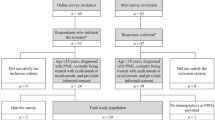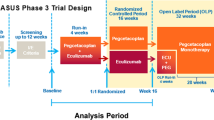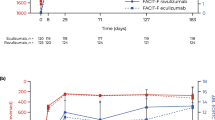Abstract
In paroxysmal nocturnal hemoglobinuria (PNH), various symptoms due to intravascular hemolysis exert a negative impact on patients’ quality of life (QOL). To determine clinical factors related with improvements in QOL in PNH patients treated, we analyzed changes in QOL scales in PNH patients treated with eculizumab based on data collected from post-marketing surveillance in Japan. Summary statistics were obtained using figures from QOL scoring systems and laboratory values, and evaluated by t test. One-year administration of eculizumab improved the most QOL items in comparison with the baseline. In particular, significant improvement of EORTC QLQ-C30 was observed in fatigue, dyspnea, physical function, and global health status. Canonical correlation analysis revealed a high correlation between QOL and laboratory values. Changes in serum lactate dehydrogenase (LDH) and hemoglobin showed strong correlations with QOL improvement. Quality of life improvement was independent of patients’ baseline characteristics of co-occurrence of bone marrow failure (BMF), or the degree of LDH. In this analysis, we found that the degree of QOL improvement was independent of the baseline LDH before eculizumab treatment and of co-occurrence of BMF. Paroxysmal nocturnal hemoglobinuria patients who have not received eculizumab treatment due to mild hemolysis may benefit from eculizumab treatment.




Similar content being viewed by others
Change history
06 July 2018
In the original publication of this article, Tables 2, 3 and 4 were published incorrectly. The corrected tables 2, 3 and 4 are given in the following pages.
References
Miyata T, Yamada N, Iida Y, Nishimura J, Takeda J, Kitani T, et al. Abnormalities of PIG-A transcripts in granulocytes from patients with paroxysmal nocturnal hemoglobinuria. N Engl J Med. 1994;330:249–55.
Rother RP, Bell L, Hillmen P, Gladwin MT. The clinical sequelae of intravascular hemolysis and extracellular plasma hemoglobin: a novel mechanism of human disease. JAMA. 2005;293:1653–62.
Parker C, Omine M, Richards S, Nishimura J, Bessler M, Ware R, et al. Diagnosis and management of paroxysmal nocturnal hemoglobinuria. Blood. 2005;106:3699–709.
Schrezenmeier H, Muus P, Socié G, Szer J, Urbano-Ispizua A, Maciejewski JP, et al. Baseline characteristics and disease burden in patients in the International Paroxysmal Nocturnal Hemoglobinuria Registry. Haematologica. 2014;99:922–9.
Almeida AM, Bedrosian C, Cole A, Muus P, Schrezenmeier H, Szer J, et al. Clinical benefit of eculizumab in patients with no transfusion history in the International Paroxysmal Nocturnal Haemoglobinuria Registry. Intern Med J. 2017;47:1026–34.
Hillmen P, Young NS, Schubert J, Brodsky RA, Socié G, Muus P, et al. The complement inhibitor eculizumab in paroxysmal nocturnal hemoglobinuria. N Engl J Med. 2006;355:1233–43.
Brodsky RA, Young NS, Antonoli E, Risitano AM, Schrezenmeier H, Schubert J, et al. Multicenter phase 3 study of the complement inhibitor eculizumab for the treatment of patients with paroxysmal nocturnal hemoglobinuria. Blood. 2008;111:1840–7.
Kanakura Y, Ohyashiki K, Shichishima T, Okamoto S, Ando K, Ninomiya H, et al. Safety and efficacy of the terminal complement inhibitor eculizumab in Japanese patients with paroxysmal nocturnal hemoglobinuria: the AEGIS clinical trial. Int J Hematol. 2011;93:36–46.
Kanakura Y, Ohyashiki K, Shichishima T, Okamoto S, Ando K, Ninomiya H, et al. Long-term efficacy and safety of eculizumab in Japanese patients with PNH: AEGIS trial. Int J Hematol. 2013;98:406–16.
Ninomiya H, Obara N, Chiba S, Usuki K, Nishiwaki K, Matsumura I, et al. Interim analysis of post-marketing surveillance of eculizumab for paroxysmal nocturnal hemoglobinuria in Japan. Int J Hematol. 2016;104:548–58.
Cella D. Manual of the functional assessment of chronic illness therapy (FACIT) measurement system. Center on Outcomes, Research and Education (CORE), Evanston Northwestern Healthcare and Northwestern University, Evanston IL, Version 4. 1997.
Yoshimura A, Kobayashi K, Fumimoto H, Fujiki Y, Eremenco S, Kudoh S. Cross-cultural validation of the Japanese functional assessment of cancer therapy-anemia (FACT-An). J Nippon Med Sch. 2004;71:314–22.
Fayers PM, Aaronson NK, Bjordal K, Groenvold M, Curran D, Bottomley A, On behalf of the EORTC Quality of Life Group. The EORTC QLQ-C30 Scoring Manual. 3rd ed. Brussels: European Organisation for Research and Treatment of Cancer; 2001.
Kobayashi K, Takeda F, Teramukai S, Gotoh I, Sakai H, Yoneda S, et al. A cross-validation of the European Organization for Research and Treatment of Cancer QLQ-C30 (EORTC QLQ-C30) for Japanese with lung cancer. Eur J Cancer. 1998;34:810–5.
Cella D, Eton DT, Lai JS, Peterman AH, Merkel DE. Combining anchor and distribution-based methods to derive minimal clinically important differences on the Functional Assessment of Cancer Therapy (FACT) anemia and fatigue scales. J Pain Symptom Manage. 2002;24:547–61.
Osoba D, Rodrigues G, Myles J, Zee B, Pater J. Interpreting the significance of changes in health-related quality-of-life scores. J Clin Oncol. 1998;16:139–44.
Groth M, Singer S, Niedeggen C, Petermann-Meyer A, Röth A, Schrezenmeier H, et al. Development of a disease-specific quality of life questionnaire for patients with aplastic anemia and/or paroxysmal nocturnal hemoglobinuria (QLQ-AA/PNH)-report on phases I and II. Ann Hematol. 2017;96:171–81.
Weitz I, Meyers G, Lamy T, Cahn JY, Uranga MT, García Vela JA, et al. Cross-sectional validation study of patient-reported outcomes in patients with paroxysmal nocturnal haemoglobinuria. Int Med J. 2013;43:298–307.
Acknowledgements
We thank all participating physicians and registered patients who took part in this surveillance study. We are grateful to Dr. Yasuo Ohashi of Dep. Integrated Science and Engineering for Sustainable Society, Chuo University for special advice on research design including statistical analysis. This study was sponsored by Alexion, and Alexion was involved in the process of the study design, data collection, analysis and manuscript preparation. Alexion approved the content of the manuscript and the submission of the manuscript for publication.
Funding
Logistical and financial cost for the post-marketing surveillance of eculizumab including statistical analysis was provided by Alexion Pharma GK.
Author information
Authors and Affiliations
Corresponding author
Ethics declarations
Conflict of interest
Dr. Kawaguchi reported personal fees from Alexion Pharma G.K., outside the submitted work; Dr. Ueda reported personal fees from Kyowa Hakko Kirin Co.Ltd. and from Celgene, outside the submitted work; Dr. Shichishima and Dr. Yonemura, report grants from Alexion Pharma G.K., outside the submitted work; Dr. Ueda, Dr. Nishimmura, Dr. Ninomiya report grant and personal fees from Alexion Pharma G.K., during the conduct of the study; Dr. Chiba report grand from Alexion Pharma G.K., during the conduct of the study. Dr. Okamoto reports grants from Alexion Pharma G.K. and from Chugai Pharmaceutical Co. Ltd., outside the submitted work. Dr. Kanakura reports grants from Alexion Pharma G.K. and from Chugai Pharmaceutical Co. Ltd. Dr. Obara, Dr. Seki, Dr. Kanda, Dr. Nakakuma, Dr. Ikezoe, and Dr. Masuko, Dr. Noji and Dr. Wada have nothing to declare; Dr. Matsuda and Mr. Akiyama report other from Alexion Pharma G.K., outside the submitted work; Employee of Alexion Pharma G.K. and Stock/stock options in the company.
About this article
Cite this article
Ueda, Y., Obara, N., Yonemura, Y. et al. Effects of eculizumab treatment on quality of life in patients with paroxysmal nocturnal hemoglobinuria in Japan. Int J Hematol 107, 656–665 (2018). https://doi.org/10.1007/s12185-018-2409-3
Received:
Revised:
Accepted:
Published:
Issue Date:
DOI: https://doi.org/10.1007/s12185-018-2409-3




